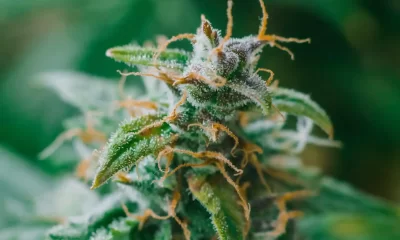Business
Cannabis Analyzer Chosen by FDA for Quick, Accurate Product Testing

The FDA recently chose Orange Photonics’ high sensitivity cannabis analyzer that can analyze 19 different cannabinoids in an estimated 10.5 minutes.
The U.S. Food and Drug Administration (FDA) announced on Aug. 18 that it has chosen a very specific company’s portable cannabis analyzer to be used to test cannabis plants as well as products.
The analyzer was created by Orange Photonics, which utilizes spectroscopy and liquid chromatography in its LightLab 3 High Sensitivity (HS) Cannabis Analyzer. The FDA plans to “…to play a pivotal role in its efforts to regulate the national cannabis industry,” a press release stated.
Previously, the LightLab 3 HS Cannabis Analyzer was chosen by the U.S. Customs and Border Protection Agency (CPB) in 2022 to be its chosen field-deployable analyzer.
“Previous to this award, the U.S. Customs and Border Protection’s Laboratories and Scientific Services conducted a multi-phase assessment of LightLab 3 Cannabis Analyzer,” said Orange Photonics President Stephanie McArdle. “Unlike general purpose, laboratory-based HPLCs, LightLab is built to analyze cannabinoids which translates into a simplified workflow, affordability, and impressive analytical capabilities.
Year-to-date data as of September 2021 showed that the analyzer helped law enforcement confiscate $2 billion worth of illicit cannabis plants and products. At the time, Josephine County Sheriff Detective Kile Henrich praised the technology for quickly identifying the differences between cannabis or hemp. “Any region that has a drug enforcement operation should use the LightLab Cannabis Analyzer,” said Henrich. “LightLab saves time on having to take confiscated cannabis to a crime lab, a process which can take 30 days versus minutes for a test on-site. It saves months and prevents future lawsuits.”
According to Orange Photonics, the LightLab 3 “decreases the burden on forensic laboratories” by allowing the device to be simple to use, and test plants and products on-site where they are grown or manufactured, to provide instant results.
“The public deserves to have complete confidence in the safety, labeling, and marketing standards of products on retail shelves. State regulatory agencies have successfully relied upon the LightLab 3 Cannabis Analyzer technology for years,” said McArdle. “The FDA’s adoption of LightLab 3 Cannabis Analyzer is a positive step as it continues to prioritize public health within the current regulatory landscape.”
Orange Photonics offers three versions of the analyzer: the LightLab 3 Cannabis Analyzer, LightLab 3 High Sensitivity, and LightLab 3 Law Enforcement version, which roughly analyzes in 10.5 minutes.
All of which can quickly analyze up to 19 cannabinoids, including Delta-9 THC, THCA, CBD, CBDA, CBN, CBG, and CBGA, in addition to others included in a “minors module.”
LightLab 3 can detect cannabis up to 0.5% (or 0.05% with the hemp compliance module), High Sensitivity up to 0.00017%/1.7ppm, and Law Enforcement version up to 0.5% (or 0.05% with the hemp compliance module).
What differs between each of the analyzers is the sample type. While the basic cannabis analyzer can test finished plant/flower, young plants, concentrates, tinctures, raffinate, and hemp compliance, the High Sensitivity version can also analyze beverage enhancers, baked goods, infused candies, pet treats, nano emulsions, and more. The Law Enforcement version focuses on dried plant/flower, young/wet plants, concentrates, edibles, and hemp compliance.
Orange Photonics’ product targets the need for quick and accurate product testing in order to maintain consumer safety. It cites the fact that over the past six years, the FDA has had to issue countless letters and safety notices to companies when they do not follow FDA regulations.
Orange Photonics plans to make numerous appearances at upcoming conventions through the rest of the year, including the California Cannabis Enforcement Summit (Aug. 22-24), TeeHC Open in Massachusetts (Sept. 8), International Drug Enforcement Conference XXXVII in Jamaica (Sept. 22), MJ Unpacked in Michigan (Oct. 10-12), and 12th Annual MJBizCon in Nevada (Nov. 28-Dec. 1).
While the LightLab 3 could play an important part in how the cannabis industry tests its products in the future, it does not affect the realm of testing in relation to the human body. Countless individuals have been punished due to THC being detected in their bloodstream long after they have consumed it.
The topic of cannabis being used as a performance-enhancing drug has been frequently revisited over the years, as many athletes have either come out in support of medical cannabis to treat sports-related conditions or dedicated themselves to the cause by creating their own cannabis brand. One of the most recent examples of this is with New Zealand-based rugby athlete, Isaia Walker-Leawere who received a one-month suspension and agreed to attend a treatment program.
Positive drug tests also negatively affect non-athletes frequently as well, with studies stating that positive workplace drug tests are at the highest levels in the past 25 years. Fortunately, some states are implementing rules to protect consumers. In Michigan, a civil service commission approved a new rule stating that no longer disqualify applicants for state positions in July.
Some legislators are also taking a stance on cannabis testing, such as Rep. Matt Gaetz recently called for putting an end to cannabis testing for military members last month. One New Jersey officer who tested positive for cannabis in 2022 was recently reinstated to his job with backpay.
Source: https://hightimes.com/news/cannabis-analyzer-chosen-by-fda-for-quick-accurate-product-testing/
Business
New Mexico cannabis operator fined, loses license for alleged BioTrack fraud

New Mexico regulators fined a cannabis operator nearly $300,000 and revoked its license after the company allegedly created fake reports in the state’s traceability software.
The New Mexico Cannabis Control Division (CCD) accused marijuana manufacturer and retailer Golden Roots of 11 violations, according to Albuquerque Business First.
Golden Roots operates the The Cannabis Revolution Dispensary.
The majority of the violations are related to the Albuquerque company’s improper use of BioTrack, which has been New Mexico’s track-and-trace vendor since 2015.
The CCD alleges Golden Roots reported marijuana production only two months after it had received its vertically integrated license, according to Albuquerque Business First.
Because cannabis takes longer than two months to be cultivated, the CCD was suspicious of the report.
After inspecting the company’s premises, the CCD alleged Golden Roots reported cultivation, transportation and sales in BioTrack but wasn’t able to provide officers who inspected the site evidence that the operator was cultivating cannabis.
In April, the CCD revoked Golden Roots’ license and issued a $10,000 fine, according to the news outlet.
The company requested a hearing, which the regulator scheduled for Sept. 1.
At the hearing, the CCD testified that the company’s dried-cannabis weights in BioTrack were suspicious because they didn’t seem to accurately reflect how much weight marijuana loses as it dries.
Company employees also poorly accounted for why they were making adjustments in the system of up to 24 pounds of cannabis, making comments such as “bad” or “mistake” in the software, Albuquerque Business First reported.
Golden Roots was fined $298,972.05 – the amount regulators allege the company made selling products that weren’t properly accounted for in BioTrack.
The CCD has been cracking down on cannabis operators accused of selling products procured from out-of-state or not grown legally:
- Regulators alleged in August that Albuquerque dispensary Sawmill Sweet Leaf sold out-of-state products and didn’t have a license for extraction.
- Paradise Exotics Distro lost its license in July after regulators alleged the company sold products made in California.
Golden Roots was the first alleged rulebreaker in New Mexico to be asked to pay a large fine.
Source: https://mjbizdaily.com/new-mexico-cannabis-operator-fined-loses-license-for-alleged-biotrack-fraud/
Business
Marijuana companies suing US attorney general in federal prohibition challenge

Four marijuana companies, including a multistate operator, have filed a lawsuit against U.S. Attorney General Merrick Garland in which they allege the federal MJ prohibition under the Controlled Substances Act is no longer constitutional.
According to the complaint, filed Thursday in U.S. District Court in Massachusetts, retailer Canna Provisions, Treevit delivery service CEO Gyasi Sellers, cultivator Wiseacre Farm and MSO Verano Holdings Corp. are all harmed by “the federal government’s unconstitutional ban on cultivating, manufacturing, distributing, or possessing intrastate marijuana.”
Verano is headquartered in Chicago but has operations in Massachusetts; the other three operators are based in Massachusetts.
The lawsuit seeks a ruling that the “Controlled Substances Act is unconstitutional as applied to the intrastate cultivation, manufacture, possession, and distribution of marijuana pursuant to state law.”
The companies want the case to go before the U.S. Supreme Court.
They hired prominent law firm Boies Schiller Flexner to represent them.
The New York-based firm’s principal is David Boies, whose former clients include Microsoft, former presidential candidate Al Gore and Elizabeth Holmes’ disgraced startup Theranos.
Similar challenges to the federal Controlled Substances Act (CSA) have failed.
One such challenge led to a landmark Supreme Court decision in 2005.
In Gonzalez vs. Raich, the highest court in the United States ruled in a 6-3 decision that the commerce clause of the U.S. Constitution gave Congress the power to outlaw marijuana federally, even though state laws allow the cultivation and sale of cannabis.
In the 18 years since that ruling, 23 states and the District of Columbia have legalized adult-use marijuana and the federal government has allowed a multibillion-dollar cannabis industry to thrive.
Since both Congress and the U.S. Department of Justice, currently headed by Garland, have declined to intervene in state-licensed marijuana markets, the key facts that led to the Supreme Court’s 2005 ruling “no longer apply,” Boies said in a statement Thursday.
“The Supreme Court has since made clear that the federal government lacks the authority to regulate purely intrastate commerce,” Boies said.
“Moreover, the facts on which those precedents are based are no longer true.”
Verano President Darren Weiss said in a statement the company is “prepared to bring this case all the way to the Supreme Court in order to align federal law with how Congress has acted for years.”
While the Biden administration’s push to reschedule marijuana would help solve marijuana operators’ federal tax woes, neither rescheduling nor modest Congressional reforms such as the SAFER Banking Act “solve the fundamental issue,” Weiss added.
“The application of the CSA to lawful state-run cannabis business is an unconstitutional overreach on state sovereignty that has led to decades of harm, failed businesses, lost jobs, and unsafe working conditions.”
Business
Alabama to make another attempt Dec. 1 to award medical cannabis licenses

Alabama regulators are targeting Dec. 1 to award the first batch of medical cannabis business licenses after the agency’s first two attempts were scrapped because of scoring errors and litigation.
The first licenses will be awarded to individual cultivators, delivery providers, processors, dispensaries and state testing labs, according to the Alabama Medical Cannabis Commission (AMCC).
Then, on Dec. 12, the AMCC will award licenses for vertically integrated operations, a designation set primarily for multistate operators.
Licenses are expected to be handed out 28 days after they have been awarded, so MMJ production could begin in early January, according to the Alabama Daily News.
That means MMJ products could be available for patients around early March, an AMCC spokesperson told the media outlet.
Regulators initially awarded 21 business licenses in June, only to void them after applicants alleged inconsistencies with how the applications were scored.
Then, in August, the state awarded 24 different licenses – 19 went to June recipients – only to reverse themselves again and scratch those licenses after spurned applicants filed lawsuits.
A state judge dismissed a lawsuit filed by Chicago-based MSO Verano Holdings Corp., but another lawsuit is pending.
Source: https://mjbizdaily.com/alabama-plans-to-award-medical-cannabis-licenses-dec-1/
-

 Business2 years ago
Business2 years agoPot Odor Does Not Justify Probable Cause for Vehicle Searches, Minnesota Court Affirms
-

 Business2 years ago
Business2 years agoNew Mexico cannabis operator fined, loses license for alleged BioTrack fraud
-

 Business2 years ago
Business2 years agoAlabama to make another attempt Dec. 1 to award medical cannabis licenses
-

 Business2 years ago
Business2 years agoWashington State Pays Out $9.4 Million in Refunds Relating to Drug Convictions
-

 Business2 years ago
Business2 years agoMarijuana companies suing US attorney general in federal prohibition challenge
-

 Business2 years ago
Business2 years agoLegal Marijuana Handed A Nothing Burger From NY State
-

 Business2 years ago
Business2 years agoCan Cannabis Help Seasonal Depression
-

 Blogs2 years ago
Blogs2 years agoCannabis Art Is Flourishing On Etsy











